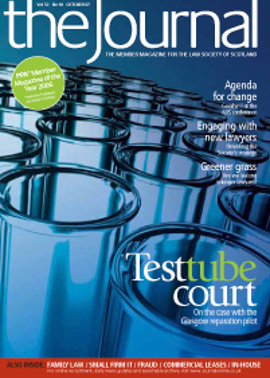The tide for change

“We won’t preside over a diminution in the quality or integrity of the Scottish legal profession. But we can’t stand still.”
These words from Kenny MacAskill, the Cabinet Secretary for Justice, in his keynote address effectively set the tone for the Society’s conference “The Public Interest – Delivering Scottish Legal Services”. A near capacity audience in the new lecture theatre at the National Galleries – almost a who’s who of the Scottish profession, including the managing partners of most of the leading firms – was left in no doubt by the platform speakers that the landscape is set to change, even if the shape of that change remains unclear.
Confidence in the profession
Mr MacAskill himself, without adding significantly to previous public comments, said enough to encourage his audience to believe that the government will listen to practitioners’ concerns as it plans to deliver on its commitment to reform designed for Scottish needs. Professing his confidence in the integrity and ethos of the profession he himself practised for 20 years, he stressed that regulation needed to serve the interests of both the profession and the public; that markets should not be opened up unless access to justice and quality of services can be maintained; that the best Scottish firms should be able to compete internationally, but local firms must be able to prosper; and that the retention of an independent referral bar is consistent with wider rights of audience. And in answer to a question from an individual with a grievance against the Society, he wanted to have fewer regulatory bodies rather than more and did not see the need for an additional overseer.
He warned his audience however that they did not have the luxury of endless time to decide on the way forward, and on issues such as legal aid fees that the government would go as far as possible to maintain services but would not always be able to go as far as solicitors would like.
Mr MacAskill’s presentation was flanked by those of Jonathan Goldsmith and Sean Williams – see panels – who each put an able case from the opposite ends of the core values-consumer interest spectrum. Earlier, opening the conference, the Society’s President Richard Henderson said that its aims were very simply that the whole issue was amongst the most important to face the profession for some time and it was right that we were all as well informed as we could be. The Society had made no decisions, but when it did it would be in knowledge of the facts, and those who contributed could also do so as fully informed as possible.
Unscripted remarks
In proper conference style, it was the exchanges with members of the audience that drew some of the most interesting and sometimes revealing comments. Challenged to explain how the conflict rules could be reconciled with banks and the like offering legal services, Julia Clark of Which? chose to class that as a detail that could be worked out once the principles were established, to an audible ripple of reaction round the floor. However at another point she challenged her audience in turn by asking where was the evidence that the present system was working to everyone’s satisfaction.
Paul Marsh, Vice President of the Law Society of England & Wales, reminded us that they had been through the same debate two or three years ago. While his advice was not to underestimate the strength and quality of ordinary solicitors and their ability to cope with change, he said that one question that should have been asked more stringently with the English reforms was how to ensure that increased consumer choice was an informed choice – without information, choice was irrelevant. Valerie Stacey QC, Vice Dean of Faculty, was tempted to conclude from that that there should be no change in the rules on direct access to counsel, having previously invited us to provide ideas on how to move the bar forward.
The consumer representatives sought to play down the public interest-consumer interest issue. Martyn Evans questioned how fundamental the distinction really was: “Neither side has the moral high ground”, he commented, “but the distinction is less than Jonathan Goldsmith suggested.” Julia Clark equally took the standpoint that we are all consumers, all members of the public. Both insisted that existing consumer protections must not be diminished – though solicitors from the floor and panel alike appear to believe that the Guarantee Fund is unsustainable.
With all these views, and many more, on offer, how far has the conference advanced the debate? It has undoubtedly generated much goodwill, and with the principal participants mainly expressing their desire to work together for reform, there is a tide there ready to be taken at the flood. Nevertheless it is clear that the difficult issues lie just below the surface, and the real test for the Society will come in the preparation of its consultation paper, expected at the end of October, and more particularly in the formulation of its policy in the light of responses, by around next February. There will be much in the months ahead for the Journal to cover.
Jonathan Goldsmith: core values and public interest
What might be described as the traditional professional standpoint was presented by Jonathan Goldsmith, Secretary General of the CCBE, the Council of European Bars and Law Societies. While recognising the combination of global economic forces and EU internal market and competition policy driving the removal of restrictive professional rules, he underlined the difference between public interest and consumer interest and the supremacy of the former. “Am I first a citizen or a consumer?”, we should ask ourselves, he urged.
Mr Goldsmith highlighted how the EU competition directorate co-ordinates the competition authorities from the individual member states to try and get others to adopt initiatives from one state, such as the England & Wales Legal Services Bill. At the same time the European Court in Wouters had recognised the right of the Dutch bar to continue to regulate the profession as respects the core values, and the “issue for today” was how to sustain the core values within a purely economic argument.
Even the Legal Services Bill, he noted, had had the requirement to protect and promote the public interest written back into it, albeit belatedly, and he questioned whether the structure of the bill was adequate to support it. The CCBE’s position remains that there are overriding non-economic reasons that speak clearly against the introduction of ABS; and as the Legal Services Board is to be entrusted with defining the approval requirements for non-lawyer owners of legal practices, it is too early to say whether the public interest will be protected.
Mr Goldsmith left us with two further questions. The first, he said, was a very difficult one, the answer to which was not yet properly defined even in the Legal Services Bill: what is the borderline between the free market and the core professional values? Secondly, can the core professional values be protected by a licensing regime as envisaged? Again, he was unable to say until he saw the rules.
Sean Williams: no obstacles insurmountable
Aligning himself closely with Kenny MacAskill’s points was Sean Williams, the OFT’s Executive Director for Markets and Projects. The OFT, he said, would be an active participant in the debate as a constructive agent for change, not by prescribing solutions. The discussion was exactly about the borderline between the integrity of the profession and the interests of the consumer. The OFT had a very longstanding interest in these issues across all the professions, to see that they were not unduly restricted whether by the behaviour of service providers, by professional rules, by regulatory bodies or by government.
The OFT proposed this approach to striking the balance: rules restricting competition, whether they emanated from the profession or from government bodies, could only be supported if they were essential to maintain the public interest and proportionate to that purpose. The professional rules discussed in Wouters had been considered justified, but the court had said that the only restrictions permitted were those that could be considered clearly necessary to protect the public interest. The OFT’s view was that the public interest had to be clearly defined and the rules properly assessed.
No obstacles to removing the present restrictions were insurmountable, Mr Williams asserted – they just needed time and thought. Safeguards would be necessary, but safeguards had been designed for other sectors without a blanket ban on entry. The “fitness to own” test in the English bill, for example, included criteria of honesty, integrity, reputation, capability and financial soundness.
As respects the subjects of the Which? super-complaint, he suggested that permitting the different branches of the profession, or lawyers and non-lawyers, to operate in partnership, would result in shared costs, thereby reducing fees and improving access to legal services – and might be the only way to sustain practices in small towns. The restriction on external ownership prevented firms from accessing capital to take advantage of new opportunities.
In this issue
- Advocacy in mediation
- Your voice will count
- Does justice need fixing?
- A case for trial?
- The tide for change
- New lawyers for all
- Leaving the profession
- Three proposals
- Options ahead on standards
- Know the need, know the cure
- The file at your fingertips
- Fraud: making your strategy work
- A wider view
- Pub games reborn
- Working with OSCR
- Goal to Leeds
- "We're all doomed" - or are we?
- Website reviews
- Book reviews
- Out of my depth?
- Court bars in-house privilege
- Leases: the war is over?
- ARTL picks up speed






